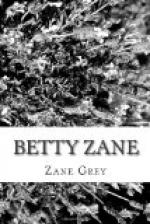At that moment the huge frame of Bennet filled up the opening in the roof and started down the ladder. In one arm he carried the limp body of a young man. When he reached the floor he laid the body down and beckoned to Mrs. Zane. Those watching saw that the young man was Will Martin, and that he was still alive. But it was evident that he had not long to live. His face had a leaden hue and his eyes were bright and glassy. Alice, his wife, flung herself on her knees beside him and tenderly raised the drooping head. No words could express the agony in her face as she raised it to Mrs. Zane. In it was a mute appeal, an unutterable prayer for hope. Mrs. Zane turned sorrowfully to her task. There was no need of her skill here. Alfred Clarke, who had been ordered to take Martin’s place on top of the block-house, paused a moment in silent sympathy. When he saw that little hole in the bared chest, from which the blood welled up in an awful stream, he shuddered and passed on. Betty looked up from her work and then turned away sick and faint. Her mute lips moved as if in prayer.
Alice was left alone with her dying husband. She tenderly supported his head on her bosom, leaned her face against his and kissed the cold, numb lips. She murmured into his already deaf ear the old tender names. He knew her, for he made a feeble effort to pass his arm round her neck. A smile illumined his face. Then death claimed him. With wild, distended eyes and with hands pressed tightly to her temples Alice rose slowly to her feet.
“Oh, God! Oh, God!” she cried.
Her prayer was answered. In a momentary lull in the battle was heard the deadly hiss of a bullet as it sped through one of the portholes. It ended with a slight sickening spat as the lead struck the flesh. Then Alice, without a cry, fell on the husband’s breast. Silas Zane found her lying dead with the body of her husband clasped closely in her arms. He threw a blanket over them and went on his wearying round of the bastions.
* * * * * * * * * * * * * * * *
The besiegers had been greatly harassed and hampered by the continual fire from Col. Zane’s house. It was exceedingly difficult for the Indians, and impossible for the British, to approach near enough to the Colonel’s house to get an effective shot. Col. Zane and his men had the advantage of being on higher ground. Also they had four rifles to a man, and they used every spare moment for reloading. Thus they were enabled to pour a deadly fire into the ranks of the enemy, and to give the impression of being much stronger in force than they really were.
About dusk the firing ceased and the Indians repaired to the river bluff. Shortly afterward their camp-fires were extinguished and all became dark and quiet. Two hours passed. Fortunately the clouds, which had at first obscured the moon, cleared away somewhat and enough light was shed on the scene to enable the watchers to discern objects near by.




